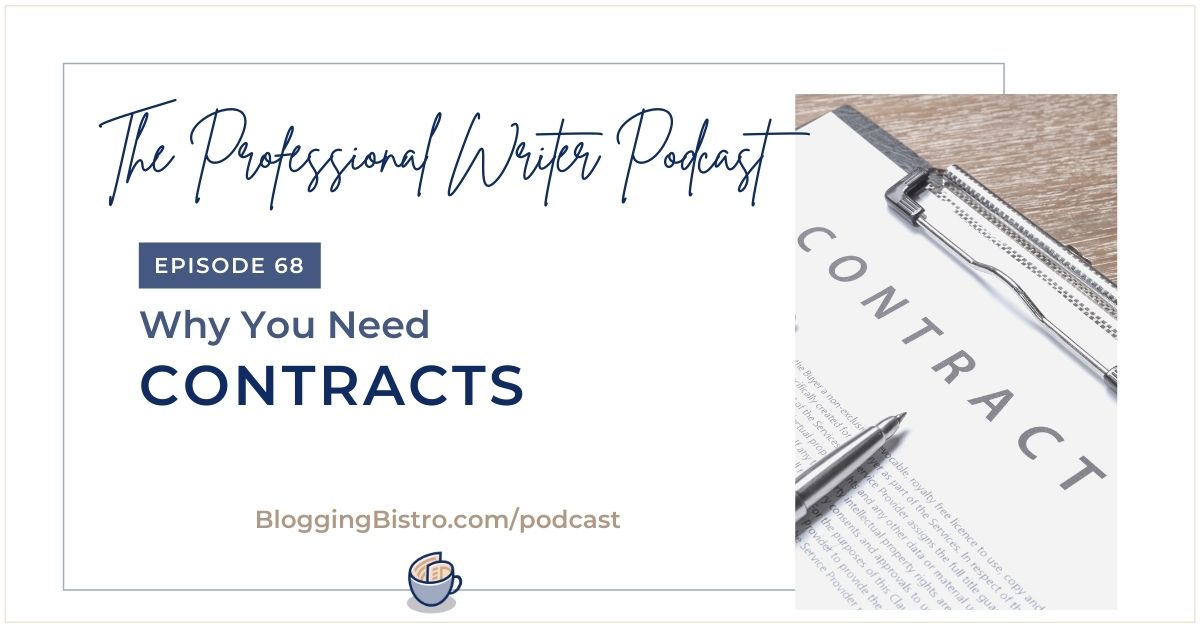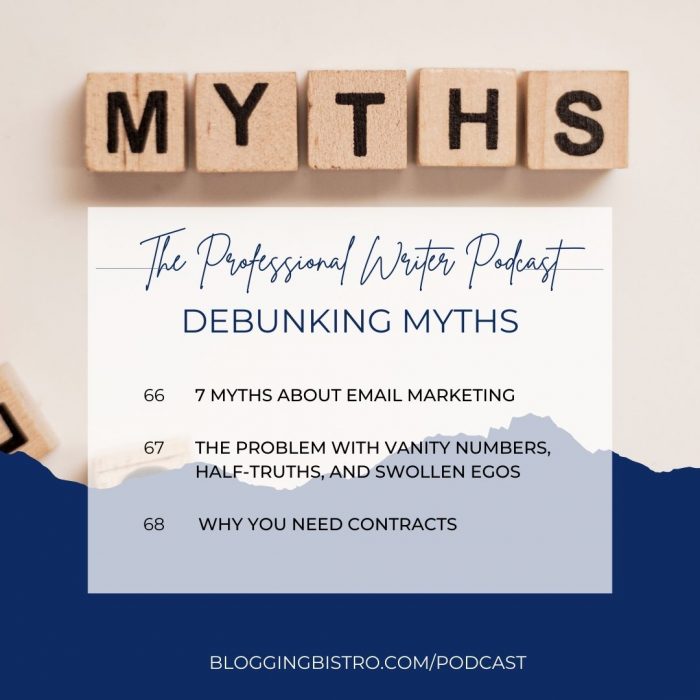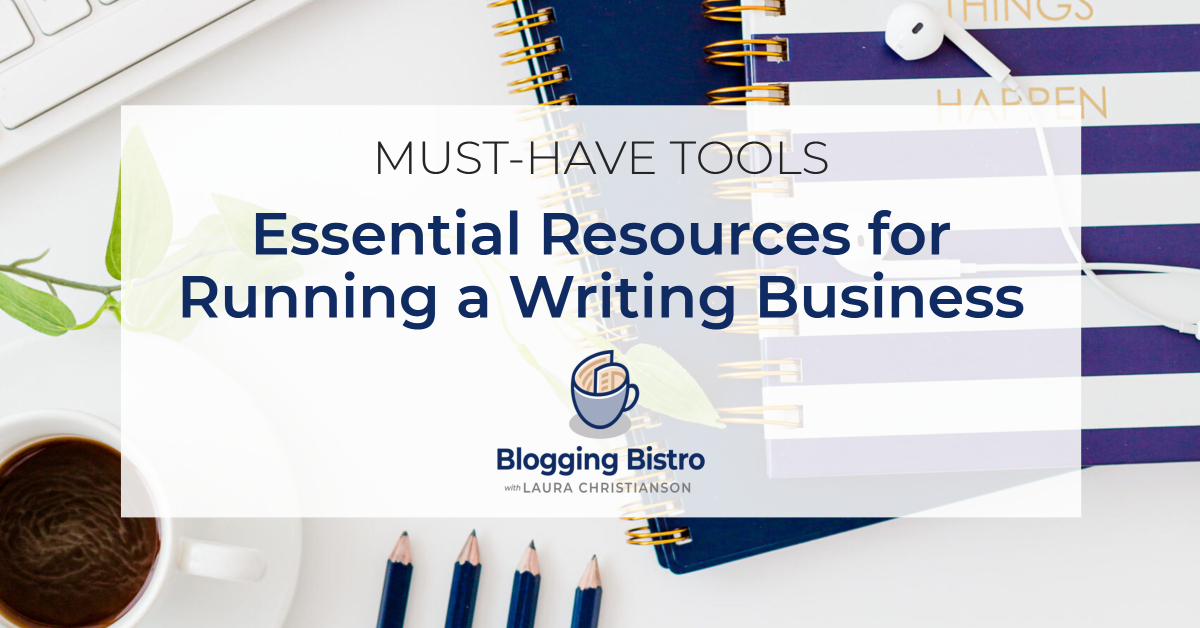68 – Why You Need Contracts

Today we’re starting off with a sing-along! If you haven’t listened to “Another Brick in the Wall” by Pink Floyd, go here for a quick refresher.
“We don’t need no education…”
Got the tune in your head?
Good.
Now grab your air guitar and sing along, replacing the first line with these lyrics:
“We don’t need no stinkin’ contracts…”
I hear that phrase (not necessarily those exact words) on a regular basis. Recently, one of my friends called to tell me she’d been invited to teach at an online event. The event coordinator made some rather vague and sketchy promises that sent red flags flapping wildly.
When I asked my friend about the terms of the contract, she replied, “Contract? They didn’t send a contract. They told me they don’t ‘do’ contracts.” (“We don’t need no stinkin’ contracts!”)
For the record:
- If a “professional” tells you they don’t “do” contracts, run away!
- If you own a business or are a public speaker and you don’t use contracts, give yourself a gentle head-smack. Starting today, commit to using contracts for all your business transactions.
I’ll help you understand why contracts are a MUST-HAVE if…
… you work with clients
… you hire people to work for you
… you are selling or enrolling in a service or program
… you are organizing or speaking at an event
I’ll share several personal examples (and a couple of horror stories). I’ll recommend important items both parties need to agree on, in writing:
- Scope of work
- Projected timelines, project milestones, and deadlines
- Client responsibilities
- Fees, payment plan, and schedule
- Privacy and non-disclosure stipulations
- Copyright policies
- Intellectual property ownership
I’ll tell you about some superb legal agreements, prepared by an intellectual property attorney, that are much, much more affordable than paying attorney fees and court fees, should someone decide to sue you because you are doing business without a contract.
A transcript of this episode is at the bottom of this page.
Let’s change the lyrics to our sing-along.
Sing with me:
“We do need those stinkin’ contracts…”
Yeah, I know. It doesn’t have the same ring as the original. But if it sticks in your head and reminds you to use contracts, I’m good with that.
Massive Action Step: Invest in contract templates
You need to be equipped with legal templates to protect your business dealings. I recommend Bobby Klinck’s Template Library. Bobby is an intellectual property attorney turned online entrepreneur, and he has developed a bunch of legal templates that are super-easy to customize – I know this because I’ve bought some of them myself.
I like Bobby’s templates so much that I became an affiliate for him. If you purchase something from Bobby, I will receive a commission.
Here’s are some contract templates and template packs you might need:
Online Genius Template Library – An all-access pass that includes ALL the contract templates you could ever want, plus any new templates Bobby adds to the library in the future.
- Client Agreement – For serving clients one-on-one
- Contractor Agreement – For working with a contractor
- Copywriting Agreement – For copywriters who work with clients
- Coaching Agreement – For coaches who work with clients
- Employee Agreements – For hiring employees
- VA Agreement – For hiring a virtual assistant
- Membership Agreement – For offering online memberships
- Course Agreement – For creating an online course
- Confidentiality Agreements – For legally sharing and protecting confidential information
- Affiliate Agreement – For setting boundaries around your relationships with affiliates
- Service Providers Pack – Includes Client Agreement, Independent Contractor Agreement, Employee Agreement Pack, and Testimonial Release
- Membership Pack – Includes Online Membership Agreement, Testimonial Release, Affiliate Agreement, Independent Contractor Agreement
- Coaches Pack – Includes Coaching Agreement, Independent Contractor Agreement, Online Course Agreement, Testimonial Release
- Course Creators Pack – Includes Online Course Agreement, Testimonial Release, Affiliate Agreement, Independent Contractor Agreement,
Debunking Myths Mini-Series
Here are links to the two previous episodes in this mini-series:
Episode 66: 7 Email Marketing Myths
Episode 67: The Problem With Vanity Numbers, Half-Truths, and Swollen Egos
How to Keep Up With the Show
Click here to join my my email list and I’ll notify you about every episode. (When you subscribe, you’ll also get my free guide, Essential Resources for Running a Writing Business.)
Join The Professional Writer Podcast Community (private Facebook group), where we discuss what we’re learning, meet our guests, and encourage one another on our writing journeys.
If you know a writer who would be interested in The Professional Writer Podcast, please share this link with them:
https://bloggingbistro.com/podcast
Thank you!
Laura
Read the Transcript
Episode 68 - Why You Need ContractsI was talking with a friend recently who had received an invitation to teach at an online event, for which she would be paid well. The terms the event coordinators offered were – how can I say this nicely – less than desirable – and they sent red flags flapping wildly.
My friend asked me to be a sounding board, to either affirm whether those red flags she was seeing really were red, or whether she was misreading the situation.
Which brings me to my first point: having a friend, colleague, mentor, or someone who’s been in business longer than you have – and is willing for you to bounce questions and concerns off of – is one of the best investments you will ever make in your business.
Often, your sounding-board person doesn’t get paid a penny – they offer to help you because they want to pay it forward, because they like you, because they see your potential, because they don’t want you to make the same mistakes they did – whatever reason, these relationships are so nurturing and helpful throughout the life of your business.
When my friend shared the details of this speaking invitation, I asked, “What are the terms on the contract, and what have you done to negotiate a better deal for yourself?”
Her response: “Contract? They didn’t send me a contract. They told me they don’t “do” contracts.”
Because they expect people to work for hire without a contract, this organization could claim my friend said she would teach at their event, based on the terms they offered, and the organization could refuse to pay her if she didn’t fulfill the vague expectations the event coordinators had of her.
On the other hand, my friend could be a no-show for the event and claim that was acceptable, since she’d never signed a contract.
I’m not saying that either of these things would happen, but they could.
Whether you are hiring someone to work for you, whether you’re hiring them to speak at an event you’re hosting, or as a contractor to perform a certain set of tasks, or as a work-for-hire, or as a part-time or full-time employee,
OR if someone is hiring you to work for them – a contract or legal agreement that clearly and specifically spells out the terms is an absolute MUST.
In this episode, I’m going to share with you some of the key items both parties need to agree on, in writing. I am not an attorney and this is not legal advice. I’m simply sharing information gleaned from my own experiences as a business owner, in hopes that you will gain a better understanding of the value of contracts.
Hang in there with me to the end of the episode, because I’ll tell you about some superb legal agreements, prepared by an intellectual property attorney, that are much, much more affordable than paying attorney fees and court fees, should someone decide to sue you because you are doing business without a contract.
Items both parties need to agree on, in a written contract:
Scope of Work
Scope of work, or what’s included in the fee. Also, what happens if there is scope creep?
When you’re coaching someone or helping them complete a project, you can quickly rack up more hours than what the contract specifies, either because the client thinks of more things they need help with as you go along, or you, the coach or vendor, spot gaps in the client’s knowledge and know that more than the contracted number of hours will be needed.
Scope creep most often happens when the client asks for additional work that isn’t included in the contract, with the expectation that they won’t have to pay additional fees.
If scope creep happens, at what stage must the vendor notify the client that they are about to incur additional fees? Is a contract addendum needed to cover the additional services the client is requesting?
Revisions
One key aspect of the scope of work section of a contract is the number of revisions. This is common among writing-related professionals such as editors, content writers, ghost writers, authors, graphic designers, and website vendors.
Let’s say you hire someone to design your logo. They work up three different concepts and you don’t like any of them. If the designer goes back to the drawing board a fourth time, do they charge you an additional fee? Or do they keep cranking out mockups until they hit on one you like? What if you hate ALL the designs? Will you lose all the money you invested?
Some logo designers promise, “I’ll provide as many revisions to your logo as you request, until you’re 100% satisfied.”
These designers are setting themselves up to lose a LOT of money, because if a designer promises unlimited revisions without charging more after a certain point, I guarantee you that the client will request revisions upon revisions and they’ll never be satisfied.
Another common aspect of the logo design process is revisions. What if you, the client, choose a logo design and want to fine-tune it? How many revisions to that design do you get for the fee you initially invested in your logo design? And what, exactly, constitutes a “revision”? Is a revision a complete reworking of a design concept? Or it is changing a color here, a font there, or adding a box around an element?
You can see how what should be a simple, straightforward project can quickly balloon out of control, and result in hurt feelings, anger, resentment, and demands for refunds all-round, if you attempt to work without a contract.
You need to set boundaries. My company’s logo contract, for example, states exactly how many logo “looks” or concepts our graphic designer will work up, and exactly how many rounds of revisions the design they choose gets before they will have to pay extra. It also states the exact fee the client will pay should they request additional revisions beyond what is contracted.
Before we even start on the logo design, our client gathers samples of logos they like and we agree on a color palette, typography style, logo feel, etc. Because we’ve done the homework together to assure that the logo complements the client’s brand message, our clients rarely request additional revisions to their logo design.
Since all this information is spelled out in my contracts, I can have a fruitful conversation with prospective clients about expectations, and we both have a chance to negotiate our agreement before we dive in to the project. This facilitates a healthy working relationship that results in very few unhappy surprises for both the client and for my team.
Projected timelines, project milestones, and deadlines.
This item is so important to specify in a contract, even a short-term contract that you expect to complete in a few days or weeks.
A business owner I know hired a vendor to build a simple, custom website that should have taken 8 weeks, start-to-finish. Instead, the site took 8 MONTHS for the vendor to build.
When I asked my friend why it was taking so long, they shrugged their shoulders and replied, “I really don’t know. Our website was supposed to launch three months ago. The vendor told me it’d be another three months before it’s ready to launch. They didn’t say why; they just said it’s taking them longer than they predicted to build the site.”
Six MONTHS longer than they predicted?
Because this business owner’s contract did NOT stipulate a timeline or include a production calendar or list consequences for not delivering the deliverables by the predicted deadline, the business owner had no recourse when the vendor failed to do their job in a timely manner.
Inevitably, during the course of any project that takes more than a week or two to complete, this thing called “life” gets in the way and delays the project by a week or two, or sometimes, a month or two or even longer.
A client we worked with experienced the sudden illness and death of a parent soon after we started on her website. Then, the identical thing happened to a member of my team – a sudden, critical illness followed by the death of a parent.
My client and my team member were both traveling all over the country to care for their respective parents, and it was an emotionally grueling time for both of them. We collectively agreed to put the client’s website development on the back burner temporarily, because what was going on in their lives was so much more important, and both of them needed time to grieve their losses.
All sorts of things have happened in the lives of our clients and in the lives of my team that have delayed the projected timelines we’ve agreed upon.
People have gotten ill, gone on vacation, gone on mission trips, switched jobs, lost their jobs, lost their homes, given birth or adopted a child – expected and unexpected events that have pushed back their launch.
Because we had outlined projected timelines in our contract and we communicated regularly throughout the course of the project – particularly as these unexpected life events intervened – no one had any issues with extending the launch date of the project.
Client Responsibilities
Client responsibilities, such as the types of information and materials the client needs to provide to the vendor before the project can begin.
This issue is common among the clients my team works with to build custom websites. Before we can start on their project, there are certain pieces of content the client needs to give us that we absolutely MUST have in order to begin designing their website.
I know that this is the case for those of you who are editors, proofreaders, and virtual assistants, as well. It’s kind of hard to edit a book manuscript until the client sends you the manuscript. It’s impossible to edit a blog post or create a podcast transcript until you have the content in hand.
Sometimes, a client doesn’t send me the necessary content for weeks after they’ve assured me they’ll send it, which delays the entire project and messes with my team’s production calendar for our other clients’ projects.
Making sure that the timeline for a project stays on track requires a joint effort on the part of both the vendor and the client.
The fee, payment plan, and schedule about when payments are to be made and consequences if they aren’t made at the agreed-upon plan.
Privacy and non-disclosure stipulations.
Copyright policies. In the case of a speaking engagement, redistribution or resale of a speaker’s presentation. Who owns the work? Who has the right to distribute it or resell it, and through which channels?
An explanation of who owns the intellectual property – you or the vendor – so you don’t get locked into ownership issues.
“Why do we need a contract? We’ll be honest.”
I firmly believe that a written agreement or contract is an essential first step in any healthy business relationship.
I have had conversations with Christians who think you should do only handshake deals. “After all, we’re both Christians. We will be honest.”
I hate to say it, but that is the biggest red flag of all. There are more than a few people who claim to be Christian and do business in the most unethical way imaginable.
How do I know this? Because I’ve worked for them. I’ve worked with them. And a couple have even worked for me… for a very short time, I might add.
I recall the time a publisher – a major Christian publishing house – hired me to do a marketing project for them. They didn’t pay me for seven months after the project was successfully completed, despite me sending them multiple invoices. Fortunately, we had signed a contract, so I did have legal recourse had I decided to take it.
I’ve had other experiences that show a lack of integrity in people who profess to be Christians. I’m relating these situations in general terms, but these things happened to me:
In one instance, a company, whose CEO publicly announced that they are a Christian, flat-out lied on their contracts. They promised a particular payout when certain goals were met, but had no intention of ever making those payouts.
Another person told me they had such a close relationship with God that they could go several weeks without sinning. This same person believed that paying taxes to the U.S. government was more of a suggestion than a requirement.
Another time, a person who was a leader in a church asked me to discount my services. Being a green entrepreneur at the time, I agreed to give them a hefty discount. That person was the most demanding, least satisfied individual I have ever worked with.
My recent contract skirmish
Wouldn’t you know it… only two days after I had the “contract conversation” with my friend, I received an invitation to speak at an online summit.
I’ve been attending summits and learning about them by joining groups for summit organizers for a couple of years. If you’re unfamiliar with summits, they are online events for which the primary objective is for the organizer and presenters to quickly grow their email lists. The organizer invites anywhere from 10-50 experts, and/or prominent people in their niche to speak or teach on a specific topic or theme.
Usually, presenters are allowed to offer a related lead magnet (free downloadable gift) as an incentive for participants to sign up for their email list.
Presenters are sometimes paid to speak at online summits, but more often, they volunteer to speak and sign up as an affiliate, so they can earn a percentage of profits when people purchase access to the digital recordings of the sessions.
An online summit can be a good business proposition, but as you can see from my explanation, summits can be complex and include lots of moving parts.
It’s essential that summit organizers and presenters have an agreement that spells out the expectations, affiliate payment details, deadlines, and so on.
The invitation I received to teach at a summit was related to one of the core services I offer. It looked as if it wouldn’t be a big drain on my time, since I was already creating content around that topic, and so I could simply repurpose content for the summit.
I told the organizer, “I’d like to participate. Please send me the presenter’s contract.”
I received this reply from the organizer: “We don’t do contracts for any of our events.”
Whoa! There was no explanation for why they don’t do contracts.
I have never, ever spoken at an event without a contract in hand, and I never will. Contracts are a basic, foundational principle of doing business.
I replied to the event organizer that “I only participate in speaking events for which there is an agreement/contract. It’s too easy for there to be misunderstandings and unintentional gray areas, without a formal agreement.”
I have directed an online writers’ conference and I served for five years on the board of a non-profit organization that hosts conferences. One of the first things we did was work up a contract template to use for our events.
Yes, it takes time and thought to prepare a contract. And it may require an investment of money to have a contract attorney review it to ensure that it meets the standards of your state or province.
A contract protects both the organizer and the speaker, the employer and the employee, the coach and the client – fill in the blank with your situation.
A written agreement helps both sides clarify expectations, deliverables, and compensation. Before you sign the contract, both parties can add or remove provisions and negotiate fees.
A contract creates a win-win situation for everyone. For you, the person who’s hiring a vendor, the agreement gives you peace-of-mind, because it clearly defines what the vendor is going to do and what the vendor needs you to do.
Also, seeing those fees in black-and-white makes the project seem real. Scary-real, perhaps, but real. It mentally solidifies the commitment you’re making to to each other.
Whether you are organizing or speaking at an event, or you’re selling or enrolling in a service or program, you MUST have a contract.
If you own a business or are a public speaker and you have not been routinely using contracts, don’t beat yourself up. But starting today, I urge you to commit to begin using contracts for all your business transactions.
Massive Action Step
Here’s a massive action step to take that will equip you with the legal templates you need to protect your business dealings.
I recommend Bobby Klinck’s Template Library. Bobby is an intellectual property attorney turned online entrepreneur, and he has developed a bunch of legal templates that are super-easy to customize – I know this because I’ve bought some of them myself.
Links to Bobby’s legal agreement templates are in the show notes, directly above this transcript.



